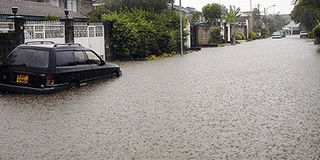Even when El Niño arrives, remember to grab a book and read

A flooded residential area in Nairobi after heavy rainfall in the past. When El Niño arrives, remember to grab a book and read. PHOTO | FILE
What you need to know:
- Ordinarily, it should be heartening that the benevolent sky “team” is poised to turn the taps upon us. But no! Instead of the met guys calling us to welcome the rain with our bare chests, they are cautioning us to dress heavily and move to higher grounds as if the rain brings with it some ill omen. We are told with such rains, there will be floods, sickness and death; so run baby, run up to the hills!
- Rain is a vital resource in both agriculture and literature. It moistens the soil and generates stories, songs and dances. When the rain starts beating us in the city, we run around like “headless chicken.”
“In november of the year nineteen seventy
a minute before or after three
a thick black cloud hung over the city
the smell of rain was every where”
The above is the first stanza of the poem “Only When it Pours” by Sam Mbure in the anthology Singing in the Night edited by Chris Wanjala. It talks of the rain falling in the city and the mixed reactions it elicits from the people.
It is near “november” of 2015 and the rains are reportedly coming. Indeed, we have been forewarned, and hopefully forearmed, that El Niño is on its way this way.
When it rains in the African savannah children come out to play around the kraal laughing and screeching in merriment. Adults watch in quiet delight albeit from the shelter of their smoky huts and warmth of their hearths.
And when the rain fails, we can sacrifice everything to get it, even two little girls like the Mokgobja family in Bessie Head’s short story Looking for a Rain God.
AFRICAN STORM
There has not been enough rain this year and the crops are wilting, tilting to poor harvest. Hence, ordinarily, it should be heartening that the benevolent sky “team” is poised to turn the taps upon us. But no! Instead of the met guys calling us to welcome the rain with our bare chests, they are cautioning us to dress heavily and move to higher grounds as if the rain brings with it some ill omen. We are told with such rains, there will be floods, sickness and death; so run baby, run up to the hills!
I bring rain, torrents of it, to this page today because of its centrality to our lives. Our granaries are full or empty depending on the rains and our songs and stories vibrate with the rhythm and rhyme of the rain.
In certain times and climes past the East African wordscape has been equated to a desert and chastised for its perceived bareness. May be, a patter- patter here and a soak-soak there waters the fertile soils for plant germination and nourishes the creative seeds in our fertile minds. As the grass and crops sprout in the field some books spring from a press somewhere.
Rain is a vital resource in both agriculture and literature. It moistens the soil and generates stories, songs and dances. When the rain starts beating us in the city, we run around like “headless chicken.”
David Rubadiri captures such madness in the poem “An African Thunderstorm.” Sam Mbure says traders “put on ‘special sale’/for raincoats and umbrellas.” Others he says “cursed the god of rain/and the whole clan of rain-makers/for sending rain where no cassava grew.”
Heck, we aren’t even sure what brings it about; is it the Mau Forest or the clouds? We do not know how much of it is enough, excess or less. An El Niño in the coming weeks could spell doom for maize and wheat farmers. Significantly such rain times, according to Mbure, is the only “time beggar washed his face” and “they from Mathare, Kaburini had a bath.”
Yet the rain comes to us in different forms. There are times that it falls in dribs and drabs that scarcely soaks the dust. Sometimes it pours in raging torrents accompanied by rumbling thunder and howling winds that keep you awake, worried and watching the creaky roof all night.
PERTINENT ISSUES
Other times there comes a gentle rain with soft subtle drops that will soothe you to a long sound sleep. They maximise seepage and when you wake up the air smells sweet and fresh and the view clear.
Books too come in various forms, sizes and colours that reflect rain patterns. Some flush lightning and clap thunder on the covers only to drizzle ineffectually over the pages. Others promise hailstorms on the blurbs but a rainbow draws the red line in the chapters that the pregnant clouds dare not cross and deliver only rasha rasha za hapa na pale.
There are the El Niño types that fall with frontal fury, yanking fridges in South C and floating food downstream to the sea gods. You read once and you fear to go back because other than their contempt and condemnation of certain “pertinent” issues, they add no value to your stock of knowledge, style and substance.
Some books fall on your laps like a good rain and send you sprawling long and wide on the couch to soak them up till you snooze. Their sheer subtlety, wisdom and charm seduce and rally your senses with bewitching insight.




